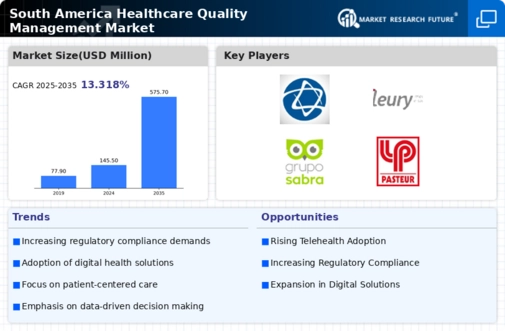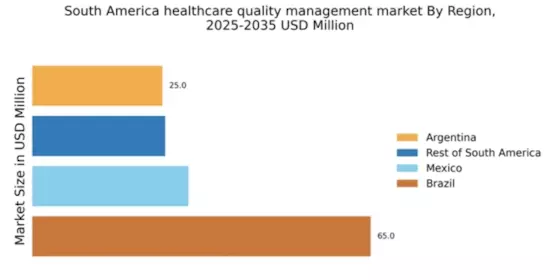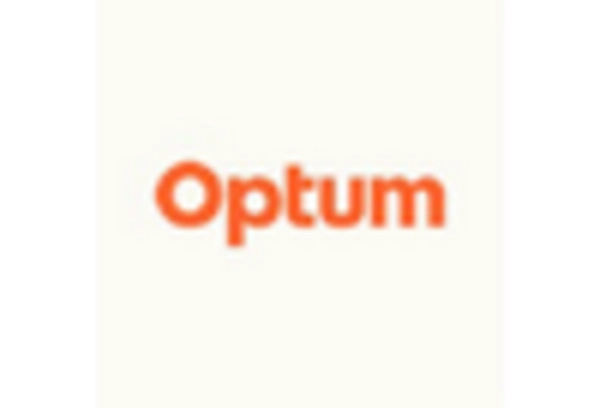Collaboration Among Healthcare Stakeholders
Collaboration among various healthcare stakeholders is emerging as a crucial driver in the healthcare quality-management market in South America. Partnerships between hospitals, clinics, and technology providers are becoming more common, facilitating the sharing of best practices and resources. This collaborative approach is likely to enhance the implementation of quality management systems across the region. By 2025, it is projected that collaborative initiatives could lead to a 30% improvement in quality management outcomes. Such partnerships not only streamline processes but also promote innovation in quality care delivery, ultimately benefiting patients and healthcare providers alike.
Integration of Quality Metrics in Healthcare
The integration of quality metrics into healthcare practices is becoming a pivotal driver in the healthcare quality-management market in South America. Healthcare providers are increasingly adopting standardized metrics to evaluate and improve service delivery. This trend is likely to enhance transparency and accountability within the healthcare system. By 2025, it is projected that around 70% of healthcare organizations in South America will implement quality metrics as part of their operational strategies. This shift not only aids in compliance with regulatory standards but also fosters a culture of continuous improvement, ultimately benefiting patient outcomes.
Rising Demand for Quality Healthcare Services
The healthcare quality-management market in South America is experiencing a notable surge in demand for quality healthcare services. This demand is driven by an increasingly informed population that prioritizes high standards of care. As patients become more aware of their rights and the quality of services available, healthcare providers are compelled to enhance their quality management systems. In 2025, it is estimated that the market for healthcare quality management solutions could reach approximately $1.5 billion in South America. This growth reflects a broader trend where healthcare institutions are investing in quality assurance programs to meet patient expectations and regulatory requirements.
Government Initiatives for Quality Improvement
Government initiatives aimed at improving healthcare quality are significantly influencing the healthcare quality-management market in South America. Various countries in the region are launching programs that incentivize healthcare providers to adopt quality management practices. For instance, funding and support for quality improvement projects are becoming more prevalent, with an estimated investment of $500 million allocated for such initiatives in 2025. These efforts are expected to enhance the overall quality of care, reduce medical errors, and improve patient satisfaction, thereby driving the growth of the healthcare quality-management market.
Increased Focus on Data-Driven Decision Making
The healthcare quality-management market in South America is witnessing an increased focus on data-driven decision making. Healthcare organizations are leveraging data analytics to assess performance, identify areas for improvement, and implement evidence-based practices. This trend is likely to enhance operational efficiency and patient care quality. By 2025, it is anticipated that approximately 60% of healthcare providers in South America will utilize advanced analytics tools to inform their quality management strategies. This shift towards data-centric approaches is expected to foster a more proactive stance in addressing quality issues and enhancing patient outcomes.

















